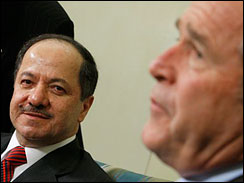
BAGHDAD, Oct. 29, 2008
(AP) Iraq wants a security agreement with the U.S. to include a clear ban on U.S. troops using Iraqi territory to attack Iraq's neighbors, the government spokesman said Wednesday, three days after a dramatic U.S. raid on Syria.

Also Wednesday, the country's most influential Shiite cleric expressed concerned that Iraqi sovereignty be protected in the pact. Grand Ayatollah Ali al-Sistani wields vast influence among the Shiite majority and his explicit opposition could scuttle the deal.
Government spokesman Ali al-Dabbagh said the ban was among four proposed amendments to the draft agreement approved by the Cabinet this week and forwarded to the U.S.
President George W. Bush said the administration is reviewing the changes and says he is confident the agreement will be approved.
In a White House meeting on Wednesday with Massoud Barzani, the president of the semiautonomous Kurdish region in northern Iraq, Mr. Bush said he is open to discussing the proposed changes.
Al-Dabbagh said the Iraqis want the right to declare the agreement null and void if the U.S. unilaterally attacks one of Iraq's neighbors.
U.S. troops launched a daring daylight attack Sunday a few miles into Syrian territory against what U.S. officials said was a key figure in al Qaeda's operation that moves foreign fighters and weapons into Iraq.
A senior U.S. official said the al Qaeda figure, an Iraqi known as Abu Ghadiyah, was killed. The official spoke on condition of anonymity because the raid was classified. Syria says eight civilians died and has demanded an apology.
For nearly two weeks, Iraqi politicians have been considering the draft security agreement, which would keep U.S. troops in Iraq through 2011 unless both sides agree that they could stay longer.
The pact would also give the Iraqis a greater role in supervising U.S. military operations and allow Iraqi courts to try U.S. soldiers and contractors accused of major crimes off duty and off base.
But critics say the current version, reached after months of tough negotiations, does not go far enough in protecting Iraqi sovereignty, and key Shiite politicians argue it stands little chance of approval in Iraq's fractious parliament in its current form.
The agreement must be approved by the end of the year when the current U.N. mandate expires or the U.S. military would have to suspend all operations in Iraq.
Al-Dabbagh said other amendments sought by the Iraqis include a clear definition of "duty" when cases arise involving crimes committed off base. The Iraqis also want to inspect all U.S. military shipments entering or leaving Iraq.
"The Americans must realize that these changes are necessary to enable the government to persuade the people to accept the agreement," al-Dabbagh said.
The Iraqis insist those measures are essential to convince the public that the government is truly sovereign, a theme repeated by al-Sistani.
A statement issued by his office said the Iranian-born cleric wants to ensure that "Iraq's sovereignty not be breached" by the accord and that he was monitoring the situation "until the final content of the security agreement becomes clear."
The U.S. military, meanwhile, handed over security responsibilities for the southern province of Wasit to Iraqi authorities. Wasit was the 13th of Iraq's 18 provinces to revert to Iraqi security control.
U.S. and Iraqi forces have been jointly seeking to shut down arms smuggling routes from Iran that use Wasit as a transit point. The weapons are thought to be going to Shiite militant groups.
The No. 2 U.S. commander in Iraq, Lt. Gen. Lloyd Austin, told the handover ceremony that Wasit seven months ago saw a weekly average of up to 18 attacks but now goes for weeks without an incident.
"The security conditions in Wasit province greatly affect the security of Baghdad and many other parts of the country." said Austin. "In the last few years, enemies have attempted to move their weapons and explosives through this province to attack Iraqi security forces and coalition forces in other parts of the country."
The handover comes when much of Iraq has seen a dramatic drop in violence although attacks persist.
On Wednesday, at least eight people were killed and wounded dozens in separate attacks.
Three people died when gunmen stormed the house of Miteb Hassan Jaddua, leader of a local U.S.-backed Sunni group in Diyala province, killing him, two relatives and wounding 14, according to the Diyala Operations Command.
Elsewhere, gunmen in speeding cars opened fire on crowds in central Hillah, 60 miles south of Baghdad, killing two people, including one policeman, and wounding five, police said.
Bombs killed a 5-year-old girl and wounded 10 people in Diyala's capital of Baqouba, police said. A roadside bomb killed one civilian and wounded eight in Baghdad's eastern Benouk district, including two policemen, authorities said.
A parked car bomb killed a policeman and wounded five people in the northern city of Mosul, according to provincial police.


